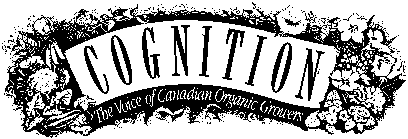

Cognition Index | Virtual Library
| Magazine Rack
Search
| Join the Ecological Solutions Roundtable
COME WWOOF WITH ME
by Jeff Johnston
This summer, more than 400 people, from as far away as Germany and New Zealand, will work as eager volunteers on Canadian organic farms. They are known by their hosts as WWOOFers, or Willing Workers on Organic Farms. WWOOF-Canada and the nine other branches of this international organization facilitate the exchange of volunteer help for organic farmers and gardeners for room and board for the worker.;
Working Weekends on Organic Farms was established in the United Kingdom over 20 years ago to provide city people an opportunity to visit and work in rural areas. As the organization grew, the name was changed to Willing Workers on Organic Farms and its major purpose now is to promote organic agriculture through first-hand experience on organic farms. There are now branches in Ireland, Denmark, Spain, Switzerland, Germany, New Zealand, and the New England states as well as Canada, Britain and Australia. ;
WWOOF-Canada is run by John Vanden Heuvel of Nelson, B.C. John, a former Katimavik host and organic gardener in Switzerland and Nova Scotia, now juggles his time between a full-time job, tending his organic farm, raising three children with his wife Inge, and answering 10-15 letters daily, most from overseas, asking for information about WWOOF-Canada or applying to the program. He answers each letter personally, providing helpful hints on travel, working with farm hosts, and dealing with immigration officials.;
Most of the volunteers working on Canadian farms come from overseas, largely because of a book called Working Your Way Around the World. However, information now travels far and fast by word of mouth. For participants, it is a cheap way to see and get to know Canada and some of its most important people, the farmers. Volunteers, who must be at least 16 years of age, pay $20 to receive a booklet of farm descriptions and addresses. They then decide where they would like to work and contact the farmer directly. They can stay for a week or two or for several months. Some have been known to stay on one farm for six months, while others visit several farms across the country. John supports the integration of the WWOOFer with the host family (including working 4-6 hours per day and participating in family outings and events), stressing to each of them that it gives the volunteer a sense of contributing to the farmer’s vision of organic farming.;
The organic farmers in WWOOF-Canada, many of whom are home-steading types, typically run very labor-intensive farms. Many have an off-farm job to help support their dream of clean food and a simpler lifestyle. They’re thankful for any volunteer helper who joins them. They provide three meals a day and a place to rest, and in return receive, as one farmer put it, "young people working their hearts out brightening our lives with their energy, warmth and intelligence. It is at once an uplifting and a humbling privilege to have them here.";
Robert and Celia Guilford farm 960 acres near Clearwater, Manitoba. Last season was their first as a host farm. While Celia was attending a course in California over the summer, Robert hosted six volunteers. Robert saw it as a win/win situation for all involved: he had help this summer when he needed it, and the volunteers had the opportunity to learn, or learn more, about organic farming. Robert says there was a lot of hard work involved, but he always tried to make it entertaining (including donkey rides!). I heard about Robert’s success from John Vanden Heuvel, who had received letters, calls, and visits from Robert’s volunteers, all raving about their experience on his farm. ;
When I visited John in June 1994, he had hosts in every province but Newfoundland and Saskatchewan, and had just signed up his first one in Québec a few months earlier. Most of the host farms are in B.C., Ontario and the Mar-itimes, but he has since signed up his first Saskatchewan host. The list grows by about one farm a week. He needs many more hosts, however, as the volunteer list is growing much faster than the host list. John sends a newsletter to all the hosts once a year to let them know the past season’s successes. ;
If you would like to host WWOOFers this summer, contact John by February 1 as he will be producing his farm list in February. Send him your name(s), farm name, address and telephone number as well as a 50-100 word description of your farm and your farm life; mention accommodations available and whether you can provide vegetarian meals. It only costs $20.00 to list your farm in the WWOOF-Canada directory. ;
Write to John Vanden Heuvel at: WWOOF-Canada, R.R. #2, S.18, C.9;
Nelson, British Columbia V1L 5P5. Phone: (250) 354-4417
Copyright © 1995.
Jeff Johnston.Reprinted with permission. All rights reserved.
Info Request | Services | Become EAP Member | Site Map
Give us your comments about the EAP site
Ecological Agriculture Projects, McGill University (Macdonald
Campus)
Ste-Anne-de-Bellevue, QC, H9X 3V9 Canada
Telephone:
(514)-398-7771
Fax:
(514)-398-7621
Email: info@eap.mcgill.ca
To report problems or otherwise comment on the structure of this site, send mail to the Webmaster